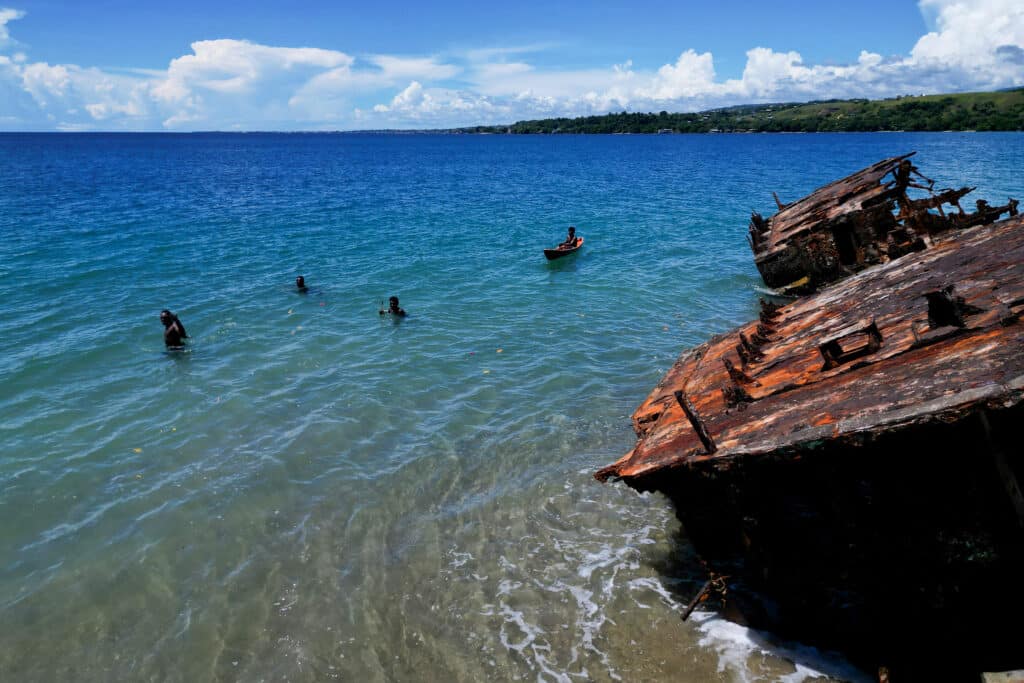
This picture taken on April 21, 2024 shows villagers next to a washed up shipwreck on the outskirts of Honiara, capital city of the Solomon Islands. – United Nations Secretary-General Antonio Guterres voiced a global climate “SOS” at a Pacific islands summit on August 27, 2024, unveiling research that shows the region’s seas rising much more swiftly than global averages. (Photo by Saeed KHAN / AFP)
Nuku’alofa, Tonga — A Nauru-backed company will forge ahead with contentious plans to start industrial deep-sea mining in 2026, a top executive has told AFP, vowing to overcome environmental criticisms that have dogged the project.
Canada-based The Metals Company is leading a contentious push to mine the sea floor underneath the Pacific Ocean, hoovering up lumps of rock studded with coveted metals.
Through a subsidiary company backed by Pacific microstate Nauru, it is hoping to open up a vast offshore economic zone where initial testing is already under way.
“If everything went according to plan, we’re still talking about 2026,” The Metals Company chief executive Gerard Barron said on the sidelines of a key Pacific summit in Tonga late Monday.
Deep sea mining does not sit on the official agenda at this year’s Pacific Islands Forum, but is expected to stir heated discussions behind closed doors.
READ: UN’s Guterres issues ‘global SOS’ over fast-rising Pacific ocean
Nauru, Tonga and the Cook Islands sit at the forefront of the emerging industry, believing it holds the key to economic prosperity in a region where land is scarce and times are tough.
Pacific neighbours Palau, Fiji and Samoa are opposed — pushing for lingering environmental questions to be cleared up before anyone takes the plunge.
Companies stand to earn billions by scraping the ocean floor for polymetallic rocks, or nodules, that are loaded with manganese, cobalt, copper and nickel — metals used to build batteries for electric vehicles.
Barron attended the region’s top summit wearing an official badge registered to Nauru.
“We’re part of the Nauru delegation,” he said.
The Metals Company said it would lodge plans with the international regulator early next year, with a view to ramping up activity in 2026.
Barron said if Nauru paved the way, other Pacific nations would swiftly follow.
READ: No tsunami warning in PH after magnitude 6.6 quake in Tonga — Phivolcs
He said Pacific opposition had been fomented by environmental activists painting an alarming picture of its risks.
“What Tonga are saying is, hey, we’d like a bit more progress on our block as well,” Barron said.
“I think all of the other nations, you will probably see a change in position from them, that is my prediction.”
A groundbreaking scientific study published earlier this year threatens to complicate things.
It showed that polymetallic nodules appear to produce oxygen through a chemical process of unclear ecological significance.
Although The Metals Company partly funded that study, Barron said it was now disputing the findings.
“We have lodged our rebuttal with that journal, and I think stand by for more information there.
“But we’re very, very confident that the conclusions from that paper are misleading.”
(FILES) This picture taken on December 13, 2022 shows a submerged tomb in a village graveyard, now underwater due to the effects of climate change, in the coastal town of Togoru, some 35 kilometres from Fijis capital city Suva. – United Nations Secretary-General Antonio Guterres voiced a global climate “SOS” at a Pacific islands summit on August 27, 2024, unveiling research that shows the region’s seas rising much more swiftly than global averages. (Photo by Saeed KHAN / AFP)
Gold rush
Nauru, population 12,500, is one of the world’s smallest countries with a mainland measuring just 20 square kilometres (7.7 square miles).
It lays claims to a mining exploration area of more than 70,000 square kilometres in a patch of sea called the Clarion Clipperton Zone.
Several companies hold the rights to areas of similar size, but Barron’s is poised to be among the first to start mining.
Phosphate mining once made Nauru one of the world’s richest countries per capita.
That boon has long dried up, leaving much of the mainland a barren moonscape.
Many scientists and environmental groups fear the deep sea extraction process could permanently disfigure relatively pristine underwater ecosystems.
Polymetallic nodules grow with the help of microbes over millions of years, forming around kernels of organic matter such as a shark’s tooth or whale bones.